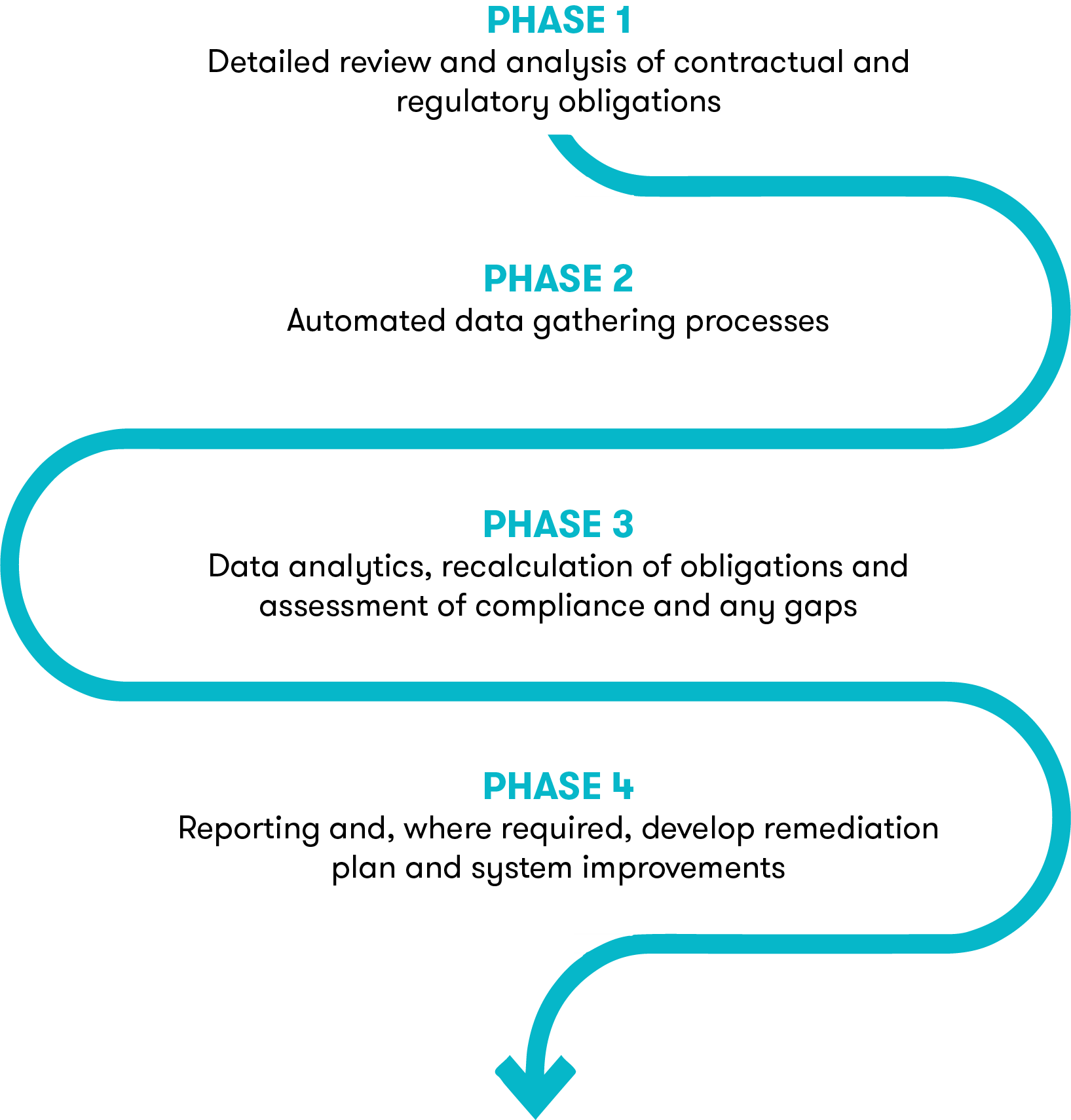- Market services
-
Compliance audits & reviews
Our audit team undertakes the complete range of audits required of Australian accounting laws to help you to help you meet obligations or fulfil best practice procedures.
-
Audit quality
We are fiercely dedicated to quality, use proven and globally tested audit methodologies, and invest in technology and innovation.
-
Financial reporting advisory
Our financial reporting advisory team helps you understand changes in accounting standards, develop strategies and communicate with your stakeholders.
-
Audit advisory
Grant Thornton’s audit advisory team works alongside our clients, providing a full range of reviews and audits required of your business.
-
Digital assurance
We capture actionable, quality insights from data within your financial reporting and auditing processes.

-
Corporate tax & advisory
We provide comprehensive corporate tax and advisory service across the full spectrum of the corporate tax process.
-
Private business tax & advisory
We work with private businesses and their leaders on all their business tax and advisory needs.
-
Tax compliance
We work alongside clients to manage all tax compliance needs and identify potential compliance or tax risk issues.
-
Employment tax
We help clients understand and address their employment tax obligations to ensure compliance and optimal tax positioning for their business and employees.
-
International tax
We understand what it means to manage tax issues across multiple jurisdictions, and create effective strategies to address complex challenges.
-
GST, stamp duty & indirect tax
Our deep technical knowledge and practical experience means we can help you manage and minimise the impact of GST and indirect tax, like stamp duty.
-
Tax law
Our team – which includes tax lawyers – helps you understand and implement regulatory requirements for your business.
-
Innovation Incentives
Our national team has extensive experience navigating all aspects of the government grants and research and development tax incentives.
-
Transfer pricing
Transfer pricing is one of the most challenging tax issues. We help clients with all their transfer pricing requirements.
-
Tax digital consulting
We analyse high-volume and unstructured data from multiple sources from our clients to give them actionable insights for complex business problems.
-
Corporate simplification
We provide corporate simplification and managed wind-down advice to help streamline and further improve your business.
-
Superannuation and SMSF
Increasingly, Australians are seeing the benefits, advantages and flexibility of taking control of their own superannuation and retirement planning.

-
Payroll consulting & Award compliance
Many organisations are grappling with a myriad of employee agreements and obligations, resulting in a wide variety of payments to their people.
-
Cyber resilience
The spectrum of cyber risks and threats is now so significant that simply addressing cybersecurity on its own isn’t enough.
-
Internal audit
We provide independent oversight and review of your organisation's control environments to manage key risks, inform good decision-making and improve performance.
-
Financial crime
Our team helps clients navigate and meet their obligations to mitigate crime as well as develop and implement their risk management strategies.
-
Consumer Data Right
Consumer Data Right (CDR) aims to provide Australians with more control over how their data is used and disclosed.
-
Risk management
We enable our clients to achieve their strategic objectives, fulfil their purpose and live their values supported by effective and appropriate risk management.
-
Controls assurance
In Australia, as with other developed economies, regulatory and market expectations regarding corporate transparency continue to increase.
-
Governance
Through fit for purpose governance we enable our clients to make the appropriate decisions on a timely basis.
-
Regulatory compliance
We enable our clients to navigate and meet their regulatory and compliance obligations.

-
Forensic accounting and dispute advisory
Our team advises at all stages of a litigation dispute, taking an independent view while gathering and reviewing evidence and contributing to expert reports.
-
Investigations
Our licensed forensic investigators with domestic and international experience deliver high quality results in the jurisdictions in which you operate.
-
Asset tracing investigations
Our team of specialist forensic accountants and investigators have extensive experience in tracing assets and the flow of funds.

-
Mergers and acquisitions
Our mergers and acquisitions specialists guide you through the whole process to get the deal done and lay the groundwork for long-term success.
-
Acquisition search & strategy
We help clients identify, finance, perform due diligence and execute acquisitions to maximise the growth opportunities of your business.
-
Selling a business
Our M&A team works with clients to achieve a full or partial sale of their business, to ensure achievement of strategic ambitions and optimal outcomes for stakeholders.
-
Operational deal services
Our operational deal services team helps to ensure the greatest possible outcome and value is gained through post merger integration or post acquisition integration.
-
Transaction advisory
Our transaction advisory services support our clients to make informed investment decisions through robust financial due diligence.
-
ESG Due Diligence
Our ESG due diligence process evaluates a company's environmental, social, and governance factors during the pre-investment phase to determine the overall maturity of the entity, manage potential risks, and identify opportunities.
-
Business valuations
We use our expertise and unique and in-depth methodology to undertake business valuations to help clients meet strategic goals.
-
Tax in mergers & acquisition
We provide expert advice for all M&A taxation aspects to ensure you meet all obligations and are optimally positioned.

-
Corporate finance
We provide effective and strategic corporate finance services across all stages of investments and transactions so clients can better manage costs and maximise returns.
-
Debt advisory
We work closely with clients and lenders to provide holistic debt advisory services so you can raise or manage existing debt to meet your strategic goals.
-
Working capital optimisation
Our proven methodology identifies opportunities to improve your processes and optimise working capital, and we work with to implement changes and monitor their effectiveness.
-
Capital markets
Our team has significant experience in capital markets and helps across every phase of the IPO process.
-
Debt and project finance raising
Backed by our experience accessing full range of available funding types, we work with clients to develop and implement capital raising strategies.
-
Private equity
We provide advice in accessing private equity capital.
-
Financial modelling
Our financial modelling advisory team provides strategic, economic, financial and valuation advice for project types and sizes.
-
Payments advisory
We provide merchants-focused payments advice on all aspects of payment processes and technologies.

-
Voluntary administration & DOCA
We help businesses considering or in voluntary administration to achieve best possible outcomes.
-
Corporate insolvency & liquidation
We help clients facing corporate insolvency to undertake the liquidation process to achieve a fair and orderly company wind up.
-
Complex and international insolvency
As corporate finance specialists, Grant Thornton can help you with raising equity, listings, corporate structuring and compliance.
-
Safe Harbour advisory
Our Safe Harbour Advisory helps directors address requirements for Safe Harbour protection and business turnaround.
-
Bankruptcy and personal insolvency
We help clients make informed choices around bankruptcy and personal insolvency to ensure the best personal and stakeholder outcome.
-
Creditor advisory services
Our credit advisory services team works provides clients with credit management assistance and credit advice to recapture otherwise lost value.
-
Small business restructuring process
We provide expert advice and guidance for businesses that may need to enter or are currently in small business restructuring process.
-
Asset tracing investigations
Our team of specialist forensic accountants and investigators have extensive experience in tracing assets and the flow of funds.

-
Independent business reviews
Does your company need a health check? Grant Thornton’s expert team can help you get to the heart of your issues to drive sustainable growth.
-
Commercial performance
We help clients improve commercial performance, profitability and address challenges after internal or external triggers require a major business model shift.
-
Safe Harbour advisory
Our Safe Harbour advisory helps directors address requirements for Safe Harbour protection and business turnaround.
-
Corporate simplification
We provide corporate simplification and managed wind-down advice to help streamline and further improve your business.
-
Director advisory services
We provide strategic director advisory services in times of business distress to help directors navigate issues and protect their company and themselves from liability.
-
Debt advisory
We work closely with clients and lenders to provide holistic debt advisory services so you can raise or manage existing debt to meet your strategic goals.

-
Business planning & strategy
Our clients can access business planning and strategy advice through our value add business strategy sessions.
-
Private business company secretarial services
We provide company secretarial services and expert advice for private businesses on all company secretarial matters.
-
Outsourced accounting services
We act as a third-party partner to international businesses looking to invest in Australia on your day-to-day finance and accounting needs.
-
Superannuation and SMSF
We provide SMSF advisory services across all aspects of superannuation and associated tax laws to help you protect and grow your wealth.
-
Management reporting
We help you build comprehensive management reporting so that you have key insights as your business grows and changes.
-
Financial reporting
We help with all financial reporting needs, including set up, scaling up, spotting issues and improving efficiency.
-
Forecasting & budgeting
We help you build and maintain a business forecasting and budgeting model for ongoing insights about your business.
-
ATO audit support
Our team of experts provide ATO audit support across the whole process to ensure ATO requirements are met.
-
Family business consulting
Our family business consulting team works with family businesses on running their businesses for continued future success.
-
Private business taxation and structuring
We help private business leaders efficiently structure their organisation for optimal operation and tax compliance.
-
Outsourced CFO services
Our outsourced CFO services provide a full suite of CFO, tax and finance services and advice to help clients manage risk, optimise operations and grow.
-
ESG, sustainability and climate reporting
There is a growing demand for organisations to provide transparency on their commitment to sustainability and disclosure of the nonfinancial impacts of their business activities. Commonly, the responsibility for sustainability and ESG reporting is landing with CFOs and finance teams, requiring a reassessment of a range of reporting processes and controls.
-
ESG, sustainability and climate advisory
With the ESG and sustainability landscape continuing to evolve, we are focussed on helping your business to understand what ESG and sustainability represents and the opportunities and challenges it can provide.
-
ESG, sustainability and climate reporting assurance
As the demand for organisations to prepare information in relation to ESG & sustainability continues to increase, through changes in regulatory requirements or stakeholder expectations, there is a growing need for assurance over the information prepared.
-
ESG and sustainability due diligence
As environmental, social, and governance (ESG) considerations become increasingly pivotal for dealmakers in Australia, it is important for investors to feel confident in assessing transactions through an ESG lens.

-
Management consulting
Our management consulting services team helps you to plan and implement the right strategy to deliver sustainable growth.
-
Financial consulting
We provide financial consulting services to keep your business running so you focus on your clients and reaching strategic goals.

-
China practice
The investment opportunities between Australia and China are well established yet, in recent years, have also diversified.
-
Japan practice
The trading partnership between Japan and Australia is long-standing and increasingly important to both countries’ economies.
-
India practice
It’s an exciting time for Indian and Australian businesses looking to each jurisdiction as part of their growth ambitions.
-
Singapore practice
Our Singapore Practice works alongside Singaporean companies to achieve growth through investment and market expansion into Australia.
-
Vietnam practice
Investment and business opportunities in Vietnam are expanding rapidly, driven by new markets, diverse industries, and Vietnam's growing role in export manufacturing, foreign investment, and strong domestic demand.

-
 Client Alert Wine not? Primary production land tax exemption no longer on the vineFor wine producers and vineyard owners, the recent New South Wales Civil and Administrative Tribunal decision in Zonadi Holdings Pty Ltd ATF Wombat Investment Trust v Chief Commissioner of State Revenue [2025] NSWCATAD 84 may spell trouble for their current primary production land tax exemptions.
Client Alert Wine not? Primary production land tax exemption no longer on the vineFor wine producers and vineyard owners, the recent New South Wales Civil and Administrative Tribunal decision in Zonadi Holdings Pty Ltd ATF Wombat Investment Trust v Chief Commissioner of State Revenue [2025] NSWCATAD 84 may spell trouble for their current primary production land tax exemptions. -
 Client Alert Unlock 2025: government grants updateIf government grants are part of your 2025 strategy, take note of the available quarter one funding opportunities. With increasing inflationary pressures, government grants can be an essential alternative funding source for businesses with critical investment projects.
Client Alert Unlock 2025: government grants updateIf government grants are part of your 2025 strategy, take note of the available quarter one funding opportunities. With increasing inflationary pressures, government grants can be an essential alternative funding source for businesses with critical investment projects. -
 Report Agribusiness, Food & Beverage Dealtracker 2024Merger & Acquisition (M&A) and equity market activity in the Agribusiness, Food & Beverage (Ag, F&B) sector is undergoing a strategic shift, as investors have become more selective and increasingly cautious in response to global economic uncertainty.
Report Agribusiness, Food & Beverage Dealtracker 2024Merger & Acquisition (M&A) and equity market activity in the Agribusiness, Food & Beverage (Ag, F&B) sector is undergoing a strategic shift, as investors have become more selective and increasingly cautious in response to global economic uncertainty. -
 Client Alert Government Grants in FY25As we embark on a new financial year, it’s crucial to take a strategic approach to understanding the government grants landscape.
Client Alert Government Grants in FY25As we embark on a new financial year, it’s crucial to take a strategic approach to understanding the government grants landscape.
-
Renewable Energy
Transformation through energy transition

-
Flexibility & benefits
The compelling client experience we’re passionate about creating at Grant Thornton can only be achieved through our people. We’ll encourage you to influence how, when and where you work, and take control of your time.
-
Your career development
At Grant Thornton, we strive to create a culture of continuous learning and growth. Throughout every stage of your career, you’ll to be encouraged and supported to seize opportunities and reach your full potential.
-
Diversity & inclusion
To be able to reach your remarkable, we understand that you need to feel connected and respected as your authentic self – so we listen and strive for deeper understanding of what belonging means.
-
In the community
We’re passionate about making a difference in our communities. Through our sustainability and community engagement initiatives, we aim to contribute to society by creating lasting benefits that empower others to thrive.
-
Graduate opportunities
As a new graduate, we aim to provide you more than just your ‘traditional’ graduate program; instead we kick start your career as an Associate and support you to turn theory into practice.
-
Vacation program
Our vacation experience program will give you the opportunity to begin your career well before you finish your degree.
-
The application process
Applying is simple! Find out more about each stage of the recruitment process here.
-
FAQs
Got questions about applying? Explore frequently asked questions about our early careers programs.
-
Our services lines
Learn about our services at Grant Thornton
-
Current opportunities
Current opportunities
-
Remarkable people
Our team members share their remarkable career journeys and experiences of working at Grant Thornton.
-
Working at Grant Thornton
Explore our culture, benefits and ways we support you in your career.
-
Current opportunities
Positions available.
-
Contact us
Get in touch
As well as grappling with a weakening economy and an unsettled global trading environment, one consistent theme that stands out in Australia is an increased focus on employment tax compliance, with a raft of law changes, audit activity and landmark cases.
Building on the 2018 Black Economy Package, the ATO has invested in strategies to combat non-compliance for employment taxes and is armed with more data than ever - following the unilateral roll out of Single Touch Payroll. In addition, the sharing of information with the Department of Home Affairs, ASIC, the ASX and AUSTRAC is making significant changes to the visibility of expatriate movements and broader employment tax compliance.
The fallout has led to leading high profile non-compliance cases. In 2019 alone, we've seen a major media outlet, a major airline, many retailers and restaurants, a Big 4 bank and a law firm exposed for under-paying their staff or failure to meet employee Superannuation contributions.
The news is not all bad though. Whilst there is a regulatory environment focusing on employment taxes, initiatives such as Single Touch Payroll and the Superannuation amnesty has presented an opportunity to ease administrative burden and take corrective action.
Single Touch Payroll (STP)
STP is a reporting framework whereby employers automatically provide the ATO payroll and superannuation information at the time it is created (i.e. at the time of payment) using standard business reporting software. Whilst not new in 2019, from 30 June 2019, STP became mandatory for all employers.
Specific to foreign employers with expatriates in Australia are:
- Reporting timing concessions for those operating a shadow payroll.
- Extensions to 30 June 2020 for entities who only have a Pay-As-You-Go (PAYG) withholding number (typically overseas entities without a taxable presence in Australia).
Superannuation compliance and amnesty
The proposed amnesty is now before the Senate. When passed, the amnesty will enable employers who unwittingly short-paid superannuation the opportunity to:
- Remove the $20 per employee per quarter administration charge
- Make the payment of superannuation guarantee charge income tax-deductible
- Remove penalties that would normally apply including the imposition of Part 7 Penalties (of up to 200% of the liability).
The amnesty is due to last 6 months from royal assent so employers should act fast to take advantage. As with any amnesty “carrot”, the stick comes with significant penalties after the amnesty period. The penalties for unpaid super after the amnesty period includes jail terms for employers who deliberately avoid complying with the superannuation guarantee law.
As we have seen with many high profile cases, including a Big 4 accounting firm, it is common for foreign employers with expatriates to not realise their requirements in respect to superannuation so now is a prime opportunity to review compliance.
Black economy measures
Despite the name, the measures introduced are bringing businesses who would not consider themselves subject to the black economy, under scrutiny. Some of these changes are:
- Businesses will no longer be able to claim a deduction for payments to their employees, where they have not withheld any amount of PAYG withholding. This could impact expatriates where the correct procedures and structuring are not followed.
- Taxable payments reporting system (TPRS) requiring the reporting of contractors are extended to Security providers, Road freight transport, Computer system design and related services. This is capturing a number of organisations that have recently been establishing their businesses in Australia.
- Common Reporting Standard (foreign bank account information exchange) as lead on from the FATCA Agreement
Main residence removal for foreign residents
Where previously the sale of a person’s ‘home’ was ordinarily exempt from CGT in Australia, these gains may be taxed in full for foreign residents and the changes could result in a significant tax exposure for current and future globally mobile employees, and in turn, their employers where there are tax equalisation policies in place.
The initial perceived impact of these changes has been focused on the restriction of the main resident exemption for foreign resident investors. However, these changes will have the same impact on:
- Australian citizens who go on assignment overseas and sell their properties during a period of foreign residency.
- Inbound assignees who sell their Australian property after returning to their home country.
The measures, which received royal assent on 12 December 2019, apply retrospectively from 9 May 2017. Further details can be found in our client alert.
Residency Tests – the present and the future
Australia has long had complex rules over Residency. This has been highlighted in 2019 in the Full Federal Court decision in Harding v FCT [2019]. In this case, the High Court refused the Commissioner special leave to appeal and found that the taxpayer had a permanent place of abode in Bahrain. The key decisions, that went against the grain of other ATO cases, is that the tax payer was a non-resident:
- Establishing a ‘place of abode’, outside Australia does not refer only to a specific house, flat or other dwelling, rather is refers to a town or country.
- The location of Mr Harding’s family (who remained in Australia) is not necessarily determinative of an individual’s tax residency.
Changes in the future
In 2019 Treasury undertook a consultation on changes to the current Australian tax residency rules. The proposal contains;
I. primary 'bright-line test' - this test will consider the time spent in Australia (i.e. ‘day count’) to automatically determine the residency status of the majority of individuals; and
II. A secondary test – known as the 'factor test'. Under this test, and for each “factor” an individual satisfies, they can be considered to have a higher level of connection to Australia. This includes factors such as, time spent in Australia; immigration status; family location; accommodation; and economic ties.
We expect continued development and updates on these proposed changes in 2020. Employers of expatriates should be aware of these changes so they are prepared for current and future assignments.
Other news
The Australian/Israel Double Tax Agreement received royal assent on 28 November and the Australia-Hong Kong Free Trade Agreement will enter into force on 17 January 2020.
What should clients be doing
As detailed by these measures, payroll and superannuation have a high-risk profile. This is inherently more complex for expatriates where they may be in receipt of additional benefits and sit outside a businesses core payroll platform or process.
Using our comprehensive Payroll Assurance Review and Recalculation tool, our team applies a lens to the remuneration processes and obligations to identify issues and assist with updating processes for future payments, recalculating correct past amounts, and developing a remediation process where required. Read more.
Payroll Assurance Review and Recalculation process for a robust solution:

























